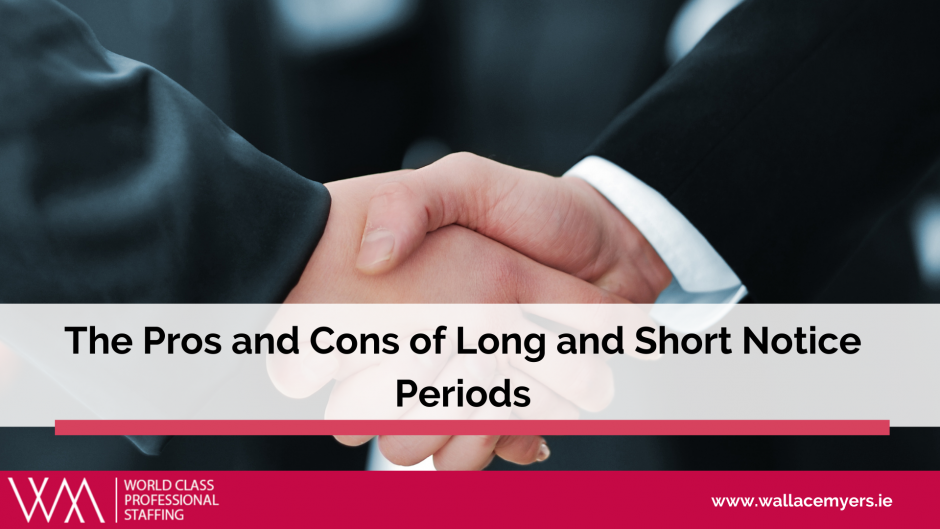

When a staff member hands in their resignation, notice periods vary from business to business and role to role. Some organisations stick to a standard four-week period, whilst others lean toward a 3-month minimum. For senior and more skilled roles, there tends to be a longer notice period, but is it worth having a person who has mentally ‘checked-out’ hanging around?
Are short notice periods better?
A notice period that is four weeks or less is considered to be standard or short for most industries in Ireland.
For businesses, a shorter notice period can put them under pressure to find the right replacement. If a replacement is not found in time for sufficient hand-over, there can be a loss of productivity and information. However, it can also be an opportunity to prevent a negative atmosphere and, when managed properly, a loss of productivity.
For recruitment agencies, shorter notice means an easier process to manage. Recruitment agency clients, for the most part, expect to have to wait 4 weeks for their new employee to start. Anything more than that can put job offers in jeopardy if the agency’s client decides to offer the person who is available sooner the role.
“In Canada and the US (for the most part) most companies have a two to four-week notice period which allows them to offload leavers but also to bring in someone new and enthusiastic much quicker”, says Anthony Johnson, Head of Financial Services Staffing at Wallace Myers International. “This has a very positive impact on the team and can help turn an environment around much quicker”.
For candidates, a shorter notice period can be beneficial as they are not working in a role they are checked out of for too long. They can get started in their new role and not dwell too long in a role or business that they are no longer engaged with.
Are Longer notice periods better?
There is no advantage to a long notice period to the employee. A long notice period can have many obstacles, more time for doubt to set in and for counter offers to be offered. More time means there’s time to keep alternative options open and for colleagues and managers to convince them to stay.
As most companies have implemented short notice periods, companies who have longer notice periods can have more issues attracting employees. Most employees will be aware that a long notice period can count against them when seeking a new role in the future.
For an employer obviously longer notice periods are a method of protection, more time to find a replacement and for the leaver to train up the newcomer. In a candidate short market, this will hardly ever be the case, as most other candidates will have a similar notice period.
Mostly, longer notice periods are counterproductive, an unhappy worker who now has to stay for a long notice period will not be productive and can often feel more inclined to gossip and tell others about their new role. In turn, this then plants doubt into the heads of others and can become a catalyst for more people to leave.
“Nothing good comes from a long notice period, especially in a candidate tight market”, says Anthony Johnson.
